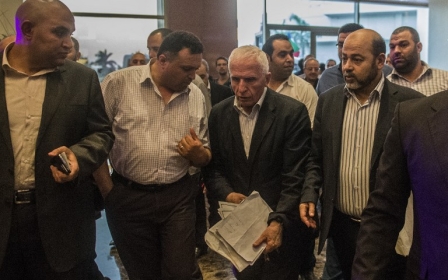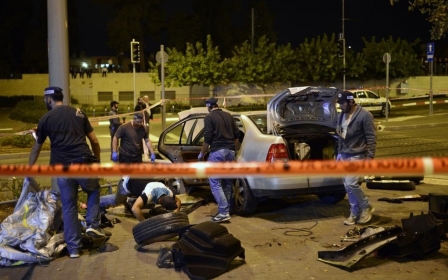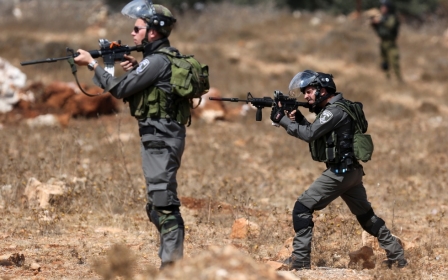In pictures: West Bank erupts in protest

Palestinians across the West Bank took to the streets in protests on Sunday, as Israel deployed troops and tanks in an attempt to quell the demonstrations.
Hundreds of Palestinians joined the funeral procession of Orwa Hammad in Silwad, a small West Bank town 15 kilometres south-east of Ramallah.
The 14-year old died on Friday after being shot multiple times by Israeli troops during clashes in Silwad on Friday.
Speaking after the killing, an Israeli army spokesperson told Reuters that Israeli forces had "managed to prevent an attack when they encountered a Palestinian man hurling a Molotov cocktail at them on the main road next to Silwad.
“They opened fire and they confirmed a hit."
The US State Department called for a “speedy and transparent” investigation into the killing of Hammad, a US citizen who had moved back to Palestine with his family eight years ago after living in New Orleans until age six.
The Israeli military has since said it will launch its own investigation.
Palestinians flocked in their hundreds to the boy’s funeral on Sunday, watching as mourners held aloft his body, wrapped in a Palestinian flag.
After the ceremony, fierce clashes broke out between West Bank Palestinians and troops from the Israeli army.
Tear gas and smoke from burning rubbish filled the air, as youths threw stones at Israeli troops, who retaliated by firing tear gas and rubber bullets.
At least ten Palestinians were reported wounded during the clashes, and there were reports of Israeli forces firing live ammunition at protesters.
Some 50 kilometres north of Silwad, but a 190 kilometre trip by car on the West Bank’s complicated road system, the Nablus village of Kafr Qaddum saw further intense clashes between Palestinian protesters and Israeli troops.
Palestinians were protesting against the programme of Israeli settlement construction – there are weekly demonstrations about Israeli settlement expansion in Kafr Qaddum.
Transport restrictions for West Bank Palestinians
In a move likely to heighten sky-rocketing tensions in the West Bank, Israel issued a directive on Sunday that will effectively prevent Palestinians from travelling on the same buses as Jewish Israelis.
The guidelines, issued by Defence Minister Moshe Ya’alon, prohibit Palestinian workers from travelling on Israeli-run public transportation that runs from central Israel to the West Bank.
Instead, they will have to travel to the Eyal Crossing, a spot far removed from current Israeli settlements, and take alternative transportation from there.
Israeli human rights organisation B’Tselem condemned the move, calling it “thinly-veiled pandering to the demand for racial segregation on buses.”
Israel had for years been under intense pressure to take such measures from settlers – many settler organisations view Palestinians travelling on Israeli-run buses near Israeli settlements as a security threat.
Tensions have been high in the West Bank for months since the devastating 51-day war in Gaza, with almost daily clashes between Palestinians and Israeli troops.
Protest over Jerusalem driver's funeral
However, the situation deteriorated even further last week after a Palestinian man hit a group of Israeli pedestrians with his car in Jerusalem on Wednesday.
A three-month old baby died hours after the crash, and a 22-year old Ecuadorian woman, Karen Mosquera, died of her wounds on Sunday.
The car's driver, Abdel Rahman al-Shaludi, died after Israeli security personnel shot him in the back as he tried to flee the scene on foot.
Dozens of demonstrators joined a mock funeral procession in honour of Shaludi on Sunday, to protest restrictions placed on his funeral by Israeli authorities.
Shaludi was due to be buried on Saturday night - an Israeli court had authorised a ceremony attended by a maximum of 80 mourners.
However, police then postponed Shaludi's burial to between 11:00 and 12:00 midnight on Saturday, demanding that the funeral be attended by just 20 people whose names had been submitted for security checks in advance of the ceremony.
After these restrictions were imposed, Shaludi's family refused to take his body from police.
A march protesting the restrictions took place in Shaludi's home neighbourhood of Silwan in east Jerusalem on Sunday.
As night fell, demonstrators processed through the streets carrying a mock coffin - subsequent clashes saw protesters throw firecrackers amid clouds of tear gas fired by Israeli troops.
New MEE newsletter: Jerusalem Dispatch
Sign up to get the latest insights and analysis on Israel-Palestine, alongside Turkey Unpacked and other MEE newsletters
Middle East Eye delivers independent and unrivalled coverage and analysis of the Middle East, North Africa and beyond. To learn more about republishing this content and the associated fees, please fill out this form. More about MEE can be found here.




